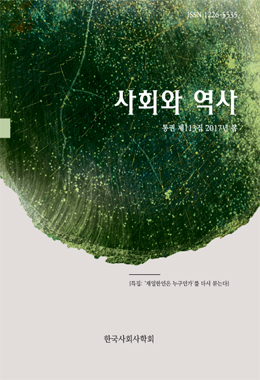이 글은 `중동건설 붐` 시기 중동현지 취업 경력을 가진 사람들의 구술 자료들과 그들의 기고문들로 이루어진 문헌 자료들을 통해 당시의 한국 경제와 정치를 파악 한다. 따라서 중동건설 붐의 내역과 사회·경제적 위상에 미처 주목하지 못했거나 법·제도와 엘리트 행위자들을 중심으로 접근한 종전의 연구들과는 상당히 다른 서술의 색조와 논점을 제시한다.
이 글은 행위자들 간의 갈등과 적대, 분열이 아니라 협력과 유대, 이로부터 귀결된 특정 체제의 존속을 말한다. 그리고 여기에서 행위자들 간의 갈등과 체제의 균열 및 변형에 대해 사유할 단서를 찾고자 한다.
이 글은 중동건설 붐을 매개로 삼아 해당 시기 발전체제(지배체제)를 구성·지탱한 행위자들의 핵심적 연결선으로서 `금전 추구`를 우선시하는 `경제주의적 합리성`을 확인한다. 그 동안 선행 연구들이 논해온 대로 민족주의 또는 국가주의가 고도성장기 발전주의 지배체제의 주요 요소였다면, 이 민족주의·국가주의의 존속과 영향력은 국가와 기업, 개인을 관통한 경제주의적 사고/행위의 준칙에 힘입은 것들이다. 그래서 `근면과 성실`, `고난 극복의 의지` 등으로 표상된 도덕주의적 한국 인상은 기실 민족주의·국가주의 담론들과 결합한 경제주의적 합리성이 `장시간·고강도 노동의 의지`로 귀결됐다는 사실을 보여준다. 그 한국인상은 돈의 복합적 기능들 및 효과들을 통해 사람들의 일상을 임금노동으로 환원하려 한 지배체제의 욕망과 이에 포섭된 대중의 생활도덕을 함께 실증한다.
이 글의 또 한 가지 과제는 참고 자료들이 반복적으로 보여준 특유의 가정 담론을 서술하고 그 의미와 지위를 논하는 것이다. 그 담론은 민족주의·국가주의와 연결된 경제성장주의의 부속적 기능물로 배치돼 있었고, 근대화의 와중에 초래될지 모르는 사회적 가부장성의 위기를 예방하려는 젠더 정치적 실천이었다. 가부장주의적 가정 담론과 도덕률은 박정희-전두환 정부 시기의 민족주의·국가주의 그리고 지배체제에 내구성을 불어넣은 중요한 또 다른 요소들이다.
This study uses oral materials and literature of people who worked in the Middle East to examine the South Korean economy and politics during the Middle East Construction Boom. Therefore, it gives a vibrantly detailed account that differs from previous studies, which have often oversimplified the South Korean economy and politics of the same period with a focus on laws, institutions and elite actors.
This study confirms the `economic rationality` that prioritizes `pursuit of money` as a key link for actors who had organized and sustained the developmental regime (governing regime) during the Middle East Construction Boom. While nationalism/ statism were main elements of the governing regime in the Hyper-Growth Age, their existence and influence were consequential of the very economic-rational regulations of thought/ conduct governing the state, corporations and individuals. South Korean`s moralistic image of `diligence and sincerity` and the `will to overcome sufferings` led to a nationalist/ statist discourse-related economic rationality of the `will to do more work and work harder.` The South Korean image demonstrates a desire of the governing regime to reduce people`s everyday life to wage-labor function.
This study also engages with family discourses. Such discourses served subsidiary functions of growth-fetishism combined with nationalism/ statism, and sustained gender-political practices that prevented the crisis of social patriarchism associated with rapid modernization. Patriarchal family discourses and morality were other important factors that provided durability to nationalism/ statism and the governing regime during the Hyper-Growth Age.


